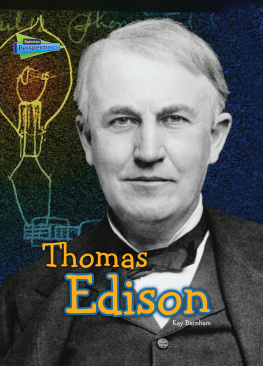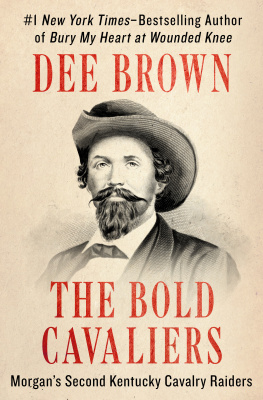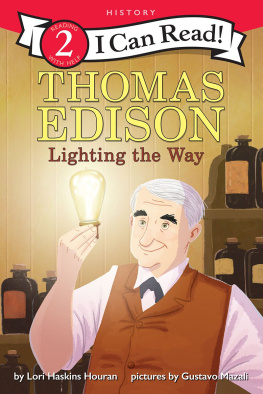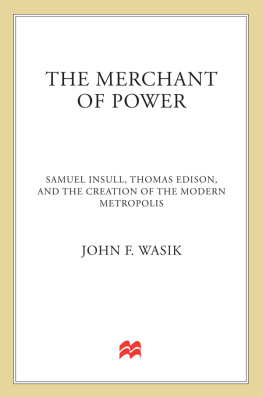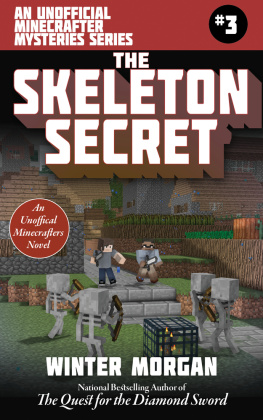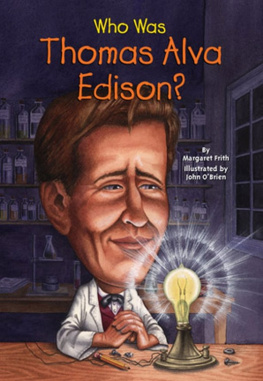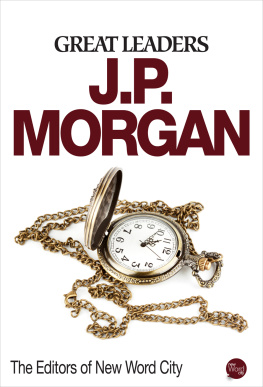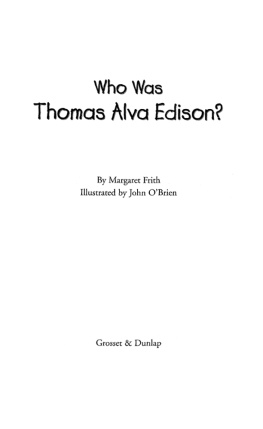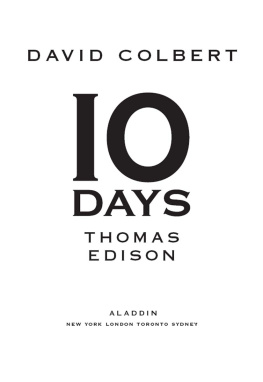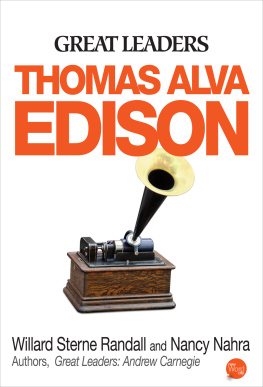John Hunt Morgan
and His Raiders
John Hunt Morgan
and
His Raiders
EDISON H. THOMAS
THE UNIVERSITY PRESS OF KENTUCKY
This book was first published in 1975 as a volume of The Kentucky Bicentennial Bookshelf.
Copyright 1985 by The University Press of Kentucky
Scholarly publisher for the Commonwealth, serving Bellarmine College, Berea College, Centre College of Kentucky, Eastern Kentucky University, The Filson Club, Georgetown College, Kentucky Historical Society, Kentucky State University, Morehead State University, Murray State University, Northern Kentucky University, Transylvania University, University of Kentucky, University of Louisville, and Western Kentucky University.
Editorial and Sales Offices: Lexington, Kentucky 405060024
Library of Congress Cataloging in Publication Data
Thomas, Edison H.
John Hunt Morgan and his raiders.
Bibliography: p.
Includes index.
1. Morgan, John Hunt, 1825-1864. 2. Confederate States of America. Army. Morgans Cavalry DivisionBiography. 3. United StatesHistoryCivil War, 1861-1865Cavalry operations. 4. Morgans Raid, 1863. 5. SoldiersKentuckyBiography. I. Title.
E547.M8T461984973.74698419596
ISBN 0-8131-1530-2
For My Grandchildren
Contents
Acknowledgments
T HE WRITING of a manuscript of any length usually requires that the author seek help from various friends, acquaintances, and even strangers. This effort is no exception.
First, I am indebted to Woodson Knight, long-time colleague and friend, editor, and former journalist, who took time from his otherwise busy existence to read my final draft with a critical eye. Although he says that he is not an avid Morgan fan, he did admit that he is one of those many Kentuckians whose grandfather fought with the general.
Others contributing in different ways include: J. Winston Coleman, Jr., author and historian, Lexington, who furnished information on early-day Lexington and about General Morgan's death; Charles A. Hodgin, Kentucky Military Institute, Lyndon, who provided data about Morgans military training at his institution; Mrs. R. D. Lawler, History Associates of Wilson County, Lebanon, Tennessee, who graciously supplied information concerning Johnnie Morgan Caldwell, the generals daughter; John Long, assistant to the executive editor, Courier-Journal & Times, Louisville, who arranged for the use of that publications rare picture of the general and his mare, Black Bess; Jerry Mart, photographer, Hopkinsville, Kentucky, for the use of photo maps in the area of Ridgetop, Tennessee; Madie L. McIntosh, hostess, Hunt-Morgan Home, Lexington, for information about the Hunt and Morgan families; Robert Nash, Shiloh National Military Park, Shiloh, Tennessee, for maps of that battle area; Elmer G. Sulzer, author, historian, and former Indiana University professor, Sarasota, Florida, for invaluable reference data and other material; and James M. Terry, member of the L & N Railroads legal staff, Louisville, for use of his original copy of Dukes history of the Raiders.
There are others, too, who provided encouragement and assistance, among them: the late Joe Creason, columnist for the Louisville Courier-Journal; Mrs. Harold Mullins, past president, Kentucky Federation of Womens Clubs, Valley Station; Mrs. Nettie Watson, library assistant, The Filson Club, Louisville; and my wife, Thelma, who provided helpful and critical comment while this manuscript was being written.
E.H.T.
Introduction
M ANY SOUTHERNERS even today look upon John Hunt Morgan as a savior, a shining knight, or a Robin Hood. To the North during that troubled time, Morgan was sometimes a brigand and often a source of grief to the military command; Federal soldiers and civilians alike habitually referred to him as the Horse Thief. And in Kentucky, in particular, one is either for him or against him; there is no middle ground.
This daring soldier has become a bigger-than-life legend. He left no descendants, yet his name will live as long as Kentucky history continues to be written. Whatever his failings, John Morgan can take his place in history as a leader of men. He may not have always led them in the right direction, but he led them. He did his best work with a small group, usually not more than 600 men. Such groups could maneuver well, rush in, attack, and rush out, then gallop off across the countryside either to safety or to another strike, miles away.
Through Morgans great personal magnetism he was able to round up some of Kentuckys finest and most daring young men. In time men from all parts of the statemore than 10,000 in allserved under his command. This often lends credence to the long familiar claim My grandfather fought with Morgan. However, if all of those claims were truthful, Morgan might well have been able to change the outcome of the war.
In spite of his independence and his eagerness to branch out on his own, Morgan with but few exceptions worked within the framework of the overall strategy mapped out in conferences with his superior officers. He had little time for paperwork, deplored routine, and hated humdrum camp life. Few of his superior officers understood his driveleast of all Braxton Bragg, who held a childish grudge forever because Morgan had been away in Kentucky when the Battle of Stones River was fought.
Just why John Hunt Morgan did what he did has fascinated many researchers. Some say that it was the death of his first wife, Rebecca, which gave him the real will to take out his grief on the North. Whatever the drive, it seemed to find its direction after he had severed his ties with Lexington.
Many of the officers who served with him, including Basil W. Duke, believed that the generals enthusiasm for war became tempered after his second marriage. This can be refuted to a great extent, because some of his most daring raids were attempted after he had married Martha Ready in Tennessee. His direct disobedience of orders in crossing the Ohio came late in his career and must have given him much to think about during his capture and confinement. His daring escape from prison afterward is an adventure over which his followers still marvel.
By the time he made his last raid into Kentucky, Morgan was a tired and disillusioned man. Still attempting to be the bold cavalier, he may well have lost any real sense of the way the war was going. After all, things had changed since Shiloh, and although he may not have given it any consideration, the South had only a few great moments after that terrible battle. But as time passed, Morgan seemed to be obsessed with the desire to make one more raid into Kentucky. Unfortunately, this desire was not always shared by his men, many of whom during the latter part of his career, were no longer the elite of Kentucky manhood. Many men who took the places of the original members no longer felt pride in being Morgans Raiders. Instead they became men to whom life did not mean a great deal. The bank robberies at Mount Sterling and Lexington were only two examples of just how insensitive the minds of his men had become. Such disregard for property had manifested itself even earlierbefore the raid across the Ohio Riverand certainly the wanton destruction and outright thievery demonstrated during the raid through Indiana and Ohio was an omen. By this time Morgan had completely lost control of disciplinehe had never really had muchand he was a saddened and confused man as he returned to Virginia in defeat to live out his last few months.
The censure from his own men and the deeply resented Northern label, King of the Horse Thieves, took its toll. The two men who admired him most, John Castleman and Basil Duke, commented on his change of appearance and outlook, his bitterness and despair, during those last days.


